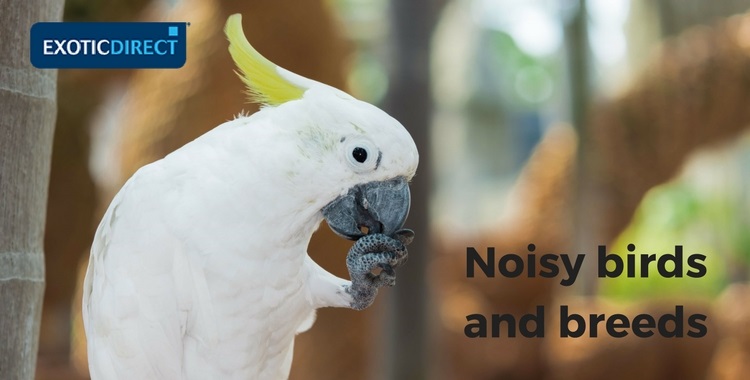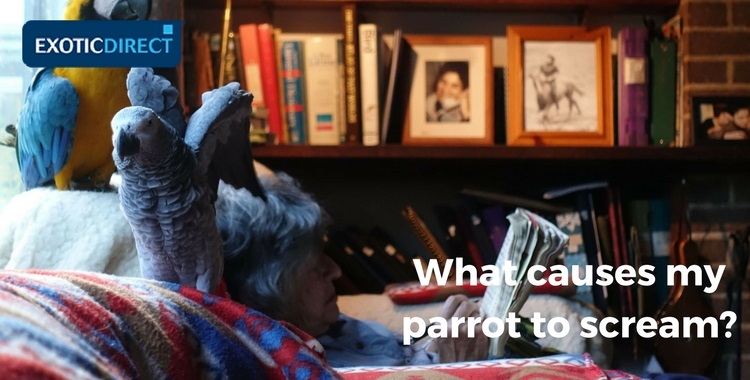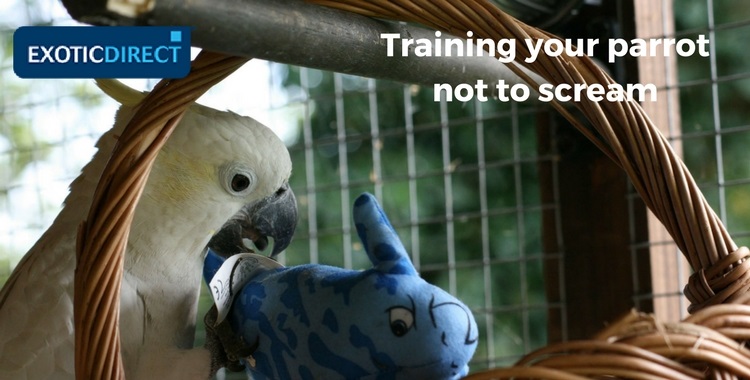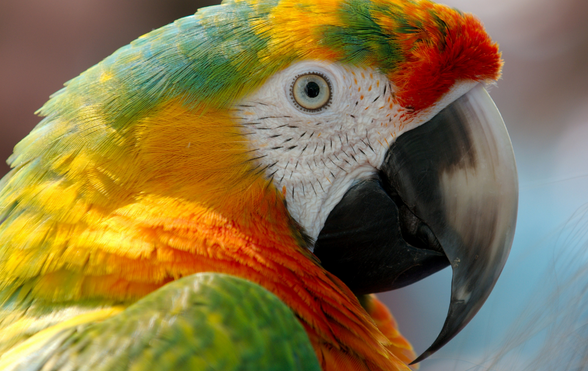A couple went into the local pet shop at 4pm. Have you got any parrots? enquired the wife.’ ‘Yes, Madam, we have.’ ‘We are looking for a quiet one. My husband objects to noise.’ The assistant glanced at his watch and replied, ‘ The toy shop closes at 5pm. You’ll find what you require there. there.’
Is your parrot insured? Get a quote for up to £5,000 of vet fee cover, death and theft cover | We’ve been insuring exotic pets since 1996 | Check out our customer reviews on Feefo.
Skip to: Screaming parrots | What is abnormal screaming? | What causes my parrot to scream? | Noisy and quiet birds and breeds | Should I keep a diary of my parrot screaming? | Training your parrot not to scream | Extinction bursts in training
Screaming parrots
Vocalising in both captive and wild birds has the same cause. The pairs are greeting the sunrise or early morning.
Most birds – wild or captive – cage or aviary species herald sunrise and sunset with squawking, whistling or singing.
Skip to: What causes my parrot to scream?
In addition, when communicating to their flock, they must be loud so that they can hear one another, either through forest cover or across wide open spaces.
They have not realised (most of them) that our homes and aviaries don’t include vast spaces!
Your parrot may call you with her contact call every few seconds, she is only asking whether you are nearby.
If you can bring yourself to think of the noise as calling – it can become more acceptable.
Normal vocalisations would be both unkind and unwise to prevent because that would be trying to obliterate normal behaviour such as calls that are made first thing in the morning and usually before roosting.
Calls that warn of impending danger. Calls that signal fear. Wild flocks have sentinel birds. In an aviary a particular bird may adopt that role and shriek if a predator flies overhead.
My pet birds, two macaws and two greys sleep in a conservatory They are fairly quiet animals.
If I’m late, however (after 8 am) Mina Military will utter medium-strength squawks very few minutes until I arrive.
 Cockatoos are the noisiest parrot
Cockatoos are the noisiest parrot
What is abnormal screaming?
Abnormal screaming is when the sound continues – on and on and on.
How long is too long? Everyone has a different tolerance level. Parrots can scream for twenty minutes. Or scream on and off for hours. The noise becomes unbearable to our ears. Many birds have to be rehomed because of neighbours’ complaints.
Check out What can your parrot eat? Diet and food ideas
What causes my parrot to scream?
-
- Parrots love drama, and if they’ve learnt that excessive screaming will cause a reaction they’ll do it even more. Carers can make screaming worse simply by shouting, as this is seen as a reward.
The parrot may cease for a few seconds before renewing the fine noise that made you respond.
Many parrots, who were rehomed because of swearing have learned the unpleasant response from being sworn at.
Covering the offending bird’s cage with a cloth in daytime is simply unkind. Even if the bird shuts up for a short time, she may start to scream in the frightening dark or may develop other behaviours like lethargy, plucking or biting.
- Parrots love drama, and if they’ve learnt that excessive screaming will cause a reaction they’ll do it even more. Carers can make screaming worse simply by shouting, as this is seen as a reward.
-
- Ill health can cause behaviour problems like biting, plucking or screaming. You may need a vet check to ensure the bird is healthy. Could an unsuitable diet be the cause? It’s unlikely but worthwhile to rule it out.
-
- Over tiredness can be a reason for excess noisiness. Again, you must evaluate your individual bird. Young birds really do need their twelve hours; mature birds can adjust to different schedules. Between 6pm and 10pm suits many households.
-
- Change in the composition of the flock. It may disturb a pet bird when a flock member vanishes. They can become upset enough when you go to work for the day but situations like death, divorce, students leaving home can distress some birds inordinately.
I believe grief is an emotion birds share with humans. Every creature grieves in its own fashion.
-
- Birds will also scream through fear just as a wild bird would do.
- Another cause of screaming may be hormonal, mating behaviour.
Unless you are unlucky, the reasons for screaming cited above may well sort themselves out simply with the passage of time.
My last two causes are harder to deal with. They are: screaming caused by jealousy and screaming caused by isolation.
- Sometimes an unlucky carer bringing in a second parrot to a lone bird in the hope it will become a companion then finds the opposite.
The original bird emphatically does not want an avian companion and only wants to get it out of the way. To cage such birds together is inviting disaster.
Or a bird bonded too closely to a human will try to attack the loved object’s companions – be they avian or another pet or another person.
- A parrot may also be screaming because she feels isolated. Her environment does not provide her with enough enrichment. In human terms – she is bored!
Find out what can cause Biting and Feather Plucking in Parrots
 Ignore your parrots if they scream
Ignore your parrots if they scream
Noisy and quiet birds and breeds
The noisiest bird is a Cockatoo. It’s thought the Moluccan Cockatoo is the loudest of the Cockatoo species and the Citroen Crested Cockatoo the quietest.
My Greys have a pleasant-sounding contact call. It sounds like ‘wheep’. I don’t know how accurate my imitation is – but the Grey always answer me when I make it.
The Macaws calls are more raucous. When their companions reply or I whistle back – the sound stops.
And the early morning chirping and trilling of my Kakariki has nothing in common sound-wise with the (to my ears) horrid shrieks of a pair of Sun Conures.
Should I keep a diary of my parrot screaming?
Yes, this is a good idea. Noting down the times of screaming is a helpful way of devising a strategy to lessen the habit.
You need to note as much as is possible concerning each episode of screaming:
- When
- Where
- Who was there?
- Who wasn’t there?
- How long did it continue?
You may find a pattern that you never imagined. If you decide (and I hope that you do) that daily sessions of training the bird will lessen its screaming – then keeping a log will become of inestimable value.
If you can find out the main cause of the screaming with patience and persistence it can be greatly reduced.
 You should reward your parrot when she doesn’t scream, and ignore her when she does
You should reward your parrot when she doesn’t scream, and ignore her when she does
Training your parrot not to scream
You should reward good behaviour and ignore bad. This is called positive reinforcement. Your parrot needs to trust you, and you require patience and the support of everyone else in the household.
The reward or ‘positive reinforcement’ involves giving your bird something good when she behaves correctly like sitting quietly on a perch.
Her reward could be praise, special food treat, a desired toy. Use rewards after the wanted behaviour – not as bribes. Remember though that some screaming is normal behaviour for a parrot.
Whether you use a clicker, a special word to signal the behaviour was correct and reward therefore is coming, is your own choice.
You can’t prevent all screaming or loud squawking, nor should you wish to but you should be able to reduce the noise to a tolerable level.
Read more about Positive Reinforcement in training your parrot.
Case study one
Here is a case study of how Maria Borgh worked with Io, her Ducorps cockatoo.
He is a rescue cockatoo without a ring. Mara does not know much of his previous history except that he was left caged for long periods.
Like many birds young or old coming into a new home, he was quiet at first. Maria said, ‘It took a few weeks before he’d accept us. It took a year before a step up. Anytime we talked he’d scream. Even if we were in a different room, he’d scream.’
Io knew the word ‘hello.’ What Maria and Magnus did was ignore him whenever he screamed. As soon as he said ‘Hello’, they‘d approach him and interact.
If he said’ hello’, when they were in another room, they’d respond immediately by calling back.
They have 3 other parrots a pair of well-socialised Greys and a little Meyers. IO up to now has not accepted them and they have time out separately.
If Io (in his cage) screamed when Maria and Magnus interacted with the other birds, they turned their backs. As soon as he said ‘Hello,’ they would turn around and talk to him
This strategy worked and within a few weeks, once the ignoring strategy was started and the reward for Hello was established, Io’s screaming diminished.
Find out How to Train your Parrot to Step-up
Case study two
In our home, Bobo, a severely clipped, plucked and screaming Umbrella cockatoo would scream for attention. She also knew how to dance.
In her case, being as clever as cockatoos are, she gradually realised that when she stopped screamed and did her little dance, she received the interaction that she craved. Same technique worked in both cases.
What both Maria and I had done was to teach our birds an alternative behaviour to screaming. In Io’s case saying hello. In Bobo’s case doing a little dance.
Extinction bursts in training
Extinction bursts are when your bird that has stopped screaming suddenly starts again. This can appear to be a setback. This where everyone in the household MUST ignore the renewed screaming.
If only one person yells shut up, only once, the bird can take this as a reward. If screaming is consistently ignored, it is more than likely it will diminish again provided that you have taught the bird some other acceptable behaviour.
Being consistent is essential. The reward which might be a special treat or in the case of most cockatoos your attention is your aim.
Conclusion
Boredom as cause of screaming can be overcome with your ingenuity and the growing trust the bird will have in you as training sessions succeed.
Find out why your individual parrot screams . Make the appropriate changes in the environment and have faith that you will both succeed
Resources. Barbara Heidereich has an excellent webinar on Screaming.
Don’t miss out!
Sign up for our FREE monthly newsletter full of interesting content! And it’s spam free.
* indicates required field

